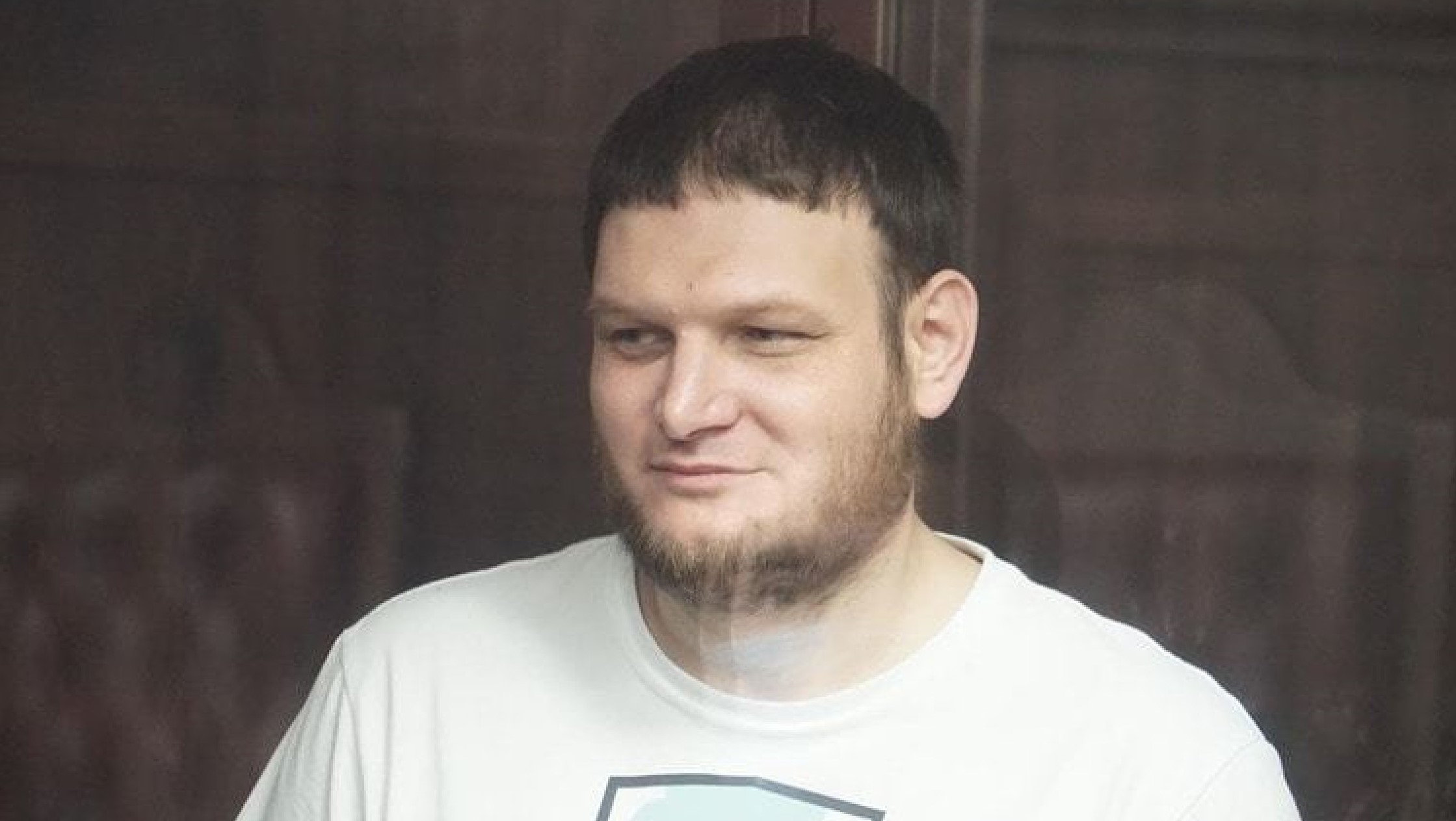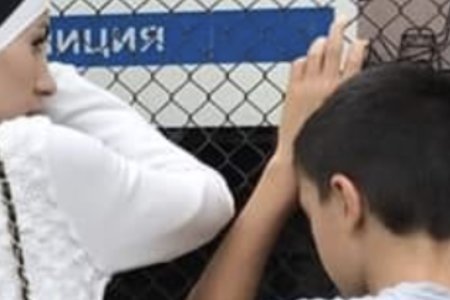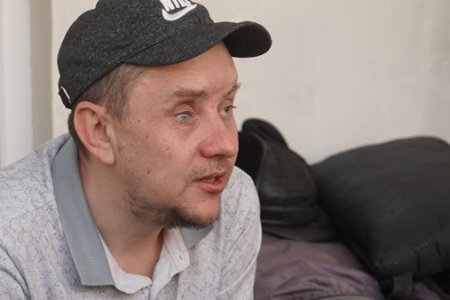
Russia’s penal service has flouted international law and Russia’s own legislation by refusing to move Crimean Tatar journalist and recognized political prisoner Remzi Bekirov closer to his family in occupied Crimea. Bekirov is serving a 19-year sentence which has been internationally condemned as part of Russia’s attack on the Crimean Tatar human rights movement. By imprisoning Remzi five and a half thousand kilometres from his wife and three children, the Russian regime is punishing the entire family for his courage and refusal to remain silence about the repression they brought to occupied Crimea.
Crimean Solidarity was informed of the refusal by Bekirov’s lawyer who visited him on 27 February. The penal service’s excuses are hard enough to translate, let alone understand. The application, after all, had not been for the recognized political prisoner’s release, but only for his transfer to a prison in Rostov oblast so that his family could have some chance of visiting him. This was rejected, with it claimed that since 24 February “a medium level of reaction” has been imposed in all Russian penal institutions. They also refused to move Bekirov to the neighbouring Stavropol region, and claimed that one can only appeal against the place that a prisoner is sent after he has been moved. This makes no sense as Bekirov has been at the Yeniseisk prison since July 2023. The penal service is also highly selective when it comes to following regulations, as Bekirov’s gruelling journey between prisons took significantly longer than the permitted 20 days, with his family allowed no contact at all with him. Remzi’s wife, Khalidze Bekirova, recently had a major operation and doctors have told her to avoid cold and to not lift heavy items, with this making it near impossible to visit her husband in Siberia. Even for her alone, and certainly with the couple’s three children, the cost of such a journey would also be prohibitive. She, and Bekirov himself, will be appealing against the penal service’s refusal.
Remzi has been imprisoned since 27 March 2019, yet he is still also confronting problems in getting the period of his transfer from prison to prison, which was hardly some kind of an excursion, counted as part of his sentence. In September 2023, he managed to get the days spent in the appalling conditions of Russian and Russian occupation SIZO [remand prison] counted, however his application to the relevant court in Chita regarding the period of transfer has not yet been answered.
The decision is urgently required as a positive answer would mean that Bekirov could be moved to a maximum-security prison colony in March, rather than having to wait until June. He is at present in the even harsher conditions of a Russian ‘prison’.
Remzi’s lawyer explained that he had asked her about recent events, including the death of Alexei Navalny in Russian captivity and political trial of Memorial Head Oleg Orlov. Like other Ukrainian political prisoners, he suffers from the information vacuum in Russian imprisonment with the only ‘news’ coming from the Russian propaganda channels ‘Rossiya-24’ and ‘REN-TV’.
Remzi Bekirov (b. 20.02.1985) is one of the 25 Crimean Tatar civic journalists and activists arrested on 27 March 2019 or soon afterwards in Russia’s most brazen attack to date on the Crimean Tatar human rights movement. A historian and tour guide by profession, Bekirov responded to Russia’s mounting repression by becoming one of the first Crimean Solidarity civic journalists, reporting on armed searches, arrests and politically motivated trials in occupied Crimea. It may well have been his swift action in streaming information about the detention in early March 2019 of the Head of the Orthodox Church of Ukraine in Crimea, Archbishop Klyment that led to the latter’s release that evening. He had recently also become a correspondent for the independent publication Grani.ru.
All of this was bound to annoy Russia’s FSB, and Bekirov had faced harassment and persecution since early 2017. He refused to be silenced, and Russia’s revenge was savage. Although the FSB and propaganda media tried to present the ‘operation’ on 27 March 2019 as about ‘fighting terrorism’, the arrests were condemned by the international community as an attack on the human rights movement in occupied Crimea. The US State Department demanded the men’s release and that Russia stop “its unjust arrests; detentions; searches and persecution of Crimean Tatar activists and journalists.” Human Rights Watch stated that attempts to portray politically active Crimean Tatars as terrorists were aimed at silencing them, while Freedom House and Civil Rights Defenders said that the arrests were aimed at terrorizing Crimean Tatars, and had nothing to do with fighting terrorism. All of the men arrested were recognized by the authoritative Memorial Human Rights Centre as political prisoners, and their release has since been repeatedly demanded by UN and other international bodies. In November 2021, former US Ambassador to Ukraine, William Taylor wrote to Remzi Bekirov expressing his admiration for Bekirov’s work as a journalist in occupied Crimea and calling him “an inspiration, not only to your fellow Ukrainians, but to freedom-loving people around the world.”
In all of these cases, the men face serious charges without being accused of any recognizable crime or even a plan to commit a crime. They were charged with ‘involvement’ in the peaceful transnational Hizb ut-Tahrir party which is legal in Ukraine, but which Russia’s supreme court declared ‘terrorist’ in 2003. That ruling was passed in secret, and is believed to have been politically motivated (making it easier for Russia to send refugees back to Uzbekistan where they faced religious persecution as members of Hizb ut-Tahrir). Remzi Bekirov and four other men (Rayim Aivazov; Farkhod Bazarov; Riza Izetov and Shaban Umerov faced the more serious charge of ‘organizing a Hizb ut-Tahrir group’ under Article 205.5 § 1 of Russia’s criminal code, the other 20 men were charged with involvement in this fictitious group (Article 205.5 § 2). In March 2020, all 25 men were also charged, under Article 278, with “planning a violent seizure of power and change in Russia’s constitutional order”.
There was no actual proof even of involvement in Hizb ut-Tahrir, let alone evidence to back charges of ‘terrorism’. The prosecution was based on flawed ‘expert assessments’ by FSB-loyal ‘experts’ of illicitly taped conversations from 2016. No attempt was ever made to explain why the FSB had sat on such alleged evidence of ‘terrorism’ for around three years before making arrests. Aside from ‘prohibited literature’ which the FSB had brought with them during armed ‘searches’ and then claimed to have found, the prosecution’s case hinged on ‘anonymous witnesses’ whose testimony could in no way be verified.
Despite the grave flaws in the indictment and the ‘trial’ and international condemnation, on 10 March 2022, ‘judges’ Oleg Volkov (presiding); Vitaly Mamedov and Magomedbasir Shuyapov from the Southern District Military Court in Rostov (Russia) passed massive sentences, larger even than those demanded by prosecutor Yevgeny Kolpikov. Remzi Bekirov and Riza Izetov (b. 1979), a lawyer and human rights activist, were both sentenced to 19 years, with the first five in a prison. Civic activists Shaban Umerov (b. 1969); Rayim Aivazov (b. 1994) and Farkhod Bazarov (b 1986) were sentenced to 18, 17 and 15 years’ imprisonment, respectively, with the first five years in a prison. These horrific sentences were upheld on 28 March 2023 by ‘presiding judge’ Sergei Vinnyk and two colleagues from the military court of appeal in Vlasikha (Moscow region).
Remzi Bekirov and Khalidze have three children: Mukhammed (b. 2009); Salakhuddin (b. 2012) and Saliye (b. 2014).
PLEASE WRITE TO REMZI BEKIROV!
The letters tell them and Moscow that they are not forgotten. Letters need to be in Russian, and on ‘safe’ subjects. If that is a problem, use the sample letter below (copying it by hand), perhaps adding a picture or photo.
Привет,
Желаю Вам здоровья, мужества и терпения, надеюсь на скорое освобождение. Простите, что мало пишу – мне трудно писать по-русски, но мы все о Вас помним.
[Hi. I wish you good health, courage and patience and hope that you will soon be released. I’m sorry that this letter is short – it’s hard for me to write in Russian., but you are not forgotten. ]
Address
663180, Российская Федерация, Красноярский край, г. Енисейск, ул. Декабристов, 11, ФКУ Тюрьма-2
Бекирову, Ремзи Рустемовичу, г.р. 1985
[In English: 663180 Russian Federation, Krasnoyarsk Krai, Yeniseysk, 11 Dekabrist St, Prison No. 2
Bekirov, Remzi Rustemovych, b. 1985]



